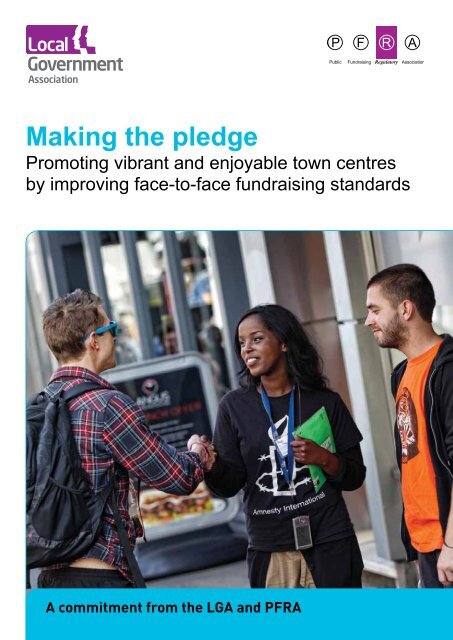Making the Pledge - LGA/PFRA street fundraising agreement
Making the Pledge - LGA/PFRA street fundraising agreement
Making the Pledge - LGA/PFRA street fundraising agreement
- No tags were found...
Create successful ePaper yourself
Turn your PDF publications into a flip-book with our unique Google optimized e-Paper software.
BackgroundWhat is face-to-face<strong>fundraising</strong>?Face-to-face <strong>fundraising</strong> is <strong>the</strong> personalsolicitation of a regular charity donation(usually via a direct debit).In 2011/12, <strong>PFRA</strong> members – professional<strong>fundraising</strong> companies and charities running<strong>the</strong>ir own in-house <strong>fundraising</strong> teams –recruited 240,000 new charity donors on<strong>the</strong> high <strong>street</strong>. Charity donors recruited on<strong>the</strong> <strong>street</strong> give around £45 million a year forcharity. This means that almost 6 per cent ofregular charity donors have been recruitedin this way, making it one of <strong>the</strong> most costeffective and sustainable forms of <strong>fundraising</strong>for charities.The issue for localcommunitiesThe majority of fundraisers are greatambassadors for <strong>the</strong>ir charities, but sadly<strong>the</strong>re is a minority who can make a realnuisance of <strong>the</strong>mselves by harassingshoppers and using over-zealous tactics.Collectors that use this approach can makepeople feel pressurised to donate whenvisiting public spaces, and can also lead toei<strong>the</strong>r congestion or dead zones if poorlypositioned on <strong>the</strong> high <strong>street</strong> or town centre.A survey by <strong>the</strong> <strong>LGA</strong> showed that more thanhalf of councils feel that <strong>street</strong> fundraisersare putting potential shoppers off visiting<strong>the</strong>ir local high <strong>street</strong> 1 .These issues are of major concern toboth councils, in <strong>the</strong>ir role as protectors ofresidents and champions of local economicgrowth, and to charities who depend on <strong>the</strong>goodwill connected with <strong>the</strong>ir reputation toraise essential funds. A sensible balanceneeds to be struck. This is <strong>the</strong> aim of this<strong>agreement</strong>.What legal powers docouncils have to respond toconcerns?While councils 2 have <strong>the</strong> power to licensedoor-to-door collection of money or o<strong>the</strong>rproperty by charities and charity cashcollections in a public place, <strong>the</strong>y do not have<strong>the</strong> powers to restrict or license face-to-face<strong>fundraising</strong> where money is pledged (forexample via a direct debit).1 Full results from <strong>the</strong> <strong>LGA</strong> face-to-face fundraiser survey can befound at http://tinyurl.com/f2fsurveyresults2 Licensing is <strong>the</strong> responsibility of <strong>the</strong> Metropolitan Policein London, while Scotland and Nor<strong>the</strong>rn Ireland havefundamentally different legal systems. The <strong>PFRA</strong> is still able tonegotiate voluntary <strong>agreement</strong>s with councils in London and <strong>the</strong>devolved administrations.<strong>Making</strong> <strong>the</strong> pledge 3
Voluntary <strong>agreement</strong>s havebeen tried and tested inover 50 council areas 4 andwe hope councils will findthis approach to managing<strong>street</strong> collectors aneffective and efficient wayof dealing with problems.“Some days we would have threedifferent groups in <strong>the</strong> city centre,each with half a dozen collectors,all trying to make sign-ups. It waslike running <strong>the</strong> gauntlet. Now,I watch <strong>the</strong> fundraisers and if Ifeel <strong>the</strong>y are being aggressive,I’ll pick it up and feed it back to<strong>the</strong> <strong>PFRA</strong>. There has been amassive reduction in <strong>the</strong> numberof complaints, down from 50 amonth to two a month, and <strong>the</strong><strong>PFRA</strong> is doing a fantastic job ofmonitoring and managing for us.”Clint Jones, Town Centre Manager atPlymouth City Council4 An <strong>LGA</strong> survey found that 78 per cent of responding councilswith a voluntary <strong>agreement</strong> had found it an effective way ofmanaging collections. http://tinyurl.com/voluntary<strong>agreement</strong>s“Since entering into <strong>the</strong><strong>agreement</strong>, complaints from <strong>the</strong>public have been dramaticallyreduced and operational issuesare swiftly resolved by <strong>PFRA</strong>staff. The responsible attitudeadopted by <strong>the</strong> <strong>PFRA</strong> andits members helped to turn asituation around.”Jane Dykes, City Centre Manager, Cityof Nottingham“Not only have complaintsdecreased since Bracknellintroduced a voluntary <strong>agreement</strong>with <strong>the</strong> <strong>PFRA</strong>, but we havepeople coming in from o<strong>the</strong>rareas to visit our high <strong>street</strong>because <strong>the</strong>y know <strong>the</strong>y won’t behassled.”Councillor Paul Bettison, Leader,Bracknell Forest Council“This Agreement has been ofgreat benefit to both parties,but more importantly, toour town centre customers,where complaints havebeen substantially reducedand problems resolved quickly.”Bob O’Brien, Town Centre Manager,Crawley Borough Council<strong>Making</strong> <strong>the</strong> pledge9
About usLocal Government Association (<strong>LGA</strong>)The Local Government Association (<strong>LGA</strong>)is a voluntary membership body and ourmember authorities cover every part ofEngland and Wales. Toge<strong>the</strong>r <strong>the</strong>y representover 50 million people and spend around£113 billion a year on local services. Theyinclude county councils, metropolitan districtcouncils, English unitary authorities, Londonboroughs and shire district councils, alongwith fire authorities, police authorities,national park authorities and passengertransport authorities. www.local.gov.ukPublic Fundraising RegulatoryAssociation (<strong>PFRA</strong>)The Public Fundraising RegulatoryAssociation is <strong>the</strong> charity-led self-regulatorymembership body for all types of faceto-face<strong>fundraising</strong> (F2F). <strong>PFRA</strong> has asdual role as a regulator in being <strong>the</strong> bridgebetween councils and charities practisingF2F: maintaining professional standards andensuring fair allocation of <strong>fundraising</strong> on <strong>the</strong>ground. www.pfra.org.uk10 <strong>Making</strong> <strong>the</strong> pledge



